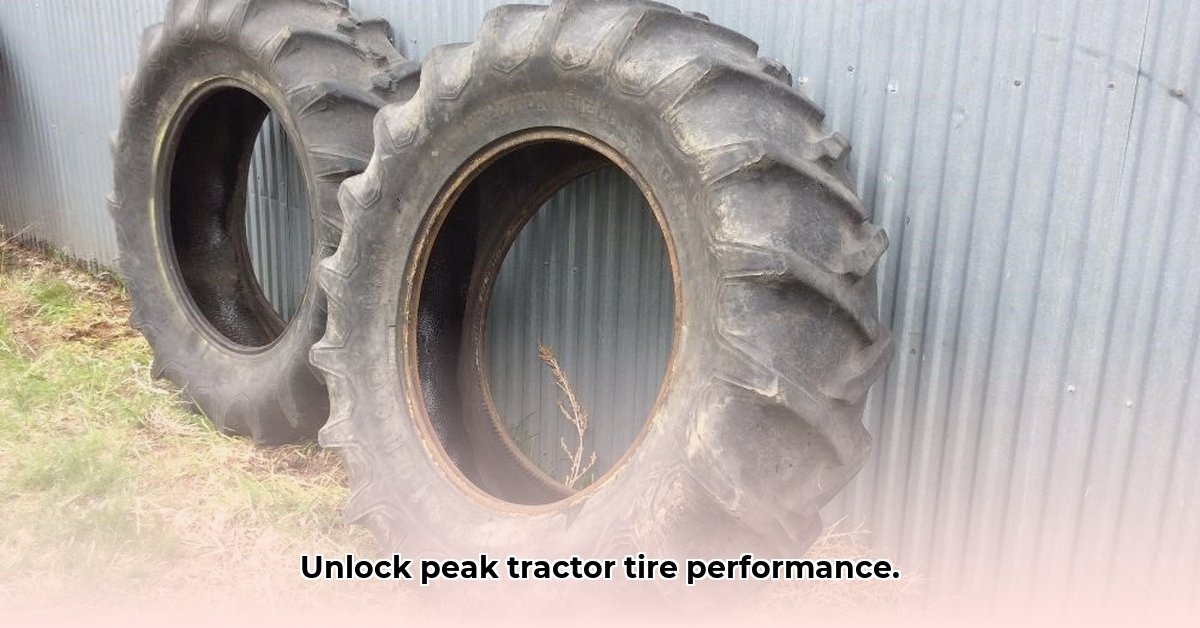
Sustainable agriculture demands efficiency and environmental responsibility. Your tractor tires play a pivotal role in achieving both. This guide focuses on optimizing the performance of 18.4-34 tractor tires – a common size – for improved fuel efficiency, reduced soil compaction, and enhanced crop yields. We'll explore tire selection, maintenance, and their impact on sustainable farming practices. For more detailed information on tire pressure, see this helpful guide.
Choosing the Right 18.4-34 Tractor Tires
Selecting the optimal 18.4-34 tire involves considering several key factors that directly influence your farm’s efficiency and environmental impact. Don't underestimate the importance of this decision; the right tires can significantly reduce costs and improve your yields.
Fuel Efficiency: Lower rolling resistance translates directly into fuel savings. Consider tires specifically designed for reduced fuel consumption. These advancements in tire technology are key to sustainable agricultural practices.
Soil Compaction: Excessive soil compaction leads to reduced water infiltration, hindered root growth, and decreased crop yields. Tires with wider footprints and lower ground pressure help minimize this issue. This is crucial to maintaining healthy soil and increasing crop productivity.
Tire Longevity: A longer-lasting tire reduces waste and saves money on replacements. Choosing durable tires with robust construction is a key component of sustainable farming. How can a longer lifespan impact your overall farm budget?
The table below compares common tire types and their characteristics:
| Tire Type | Rolling Resistance | Compaction Potential | Estimated Lifespan (Hours) | Pros | Cons |
|---|---|---|---|---|---|
| Standard Radial | Moderate | Moderate | 1500 | Relatively inexpensive, readily available | Higher fuel consumption, shorter lifespan |
| IF (Improved Flexion) | Low | Low | 2000 | Better fuel economy, less compaction | Higher initial cost |
| VF (Very High Flexion) | Very Low | Very Low | 2500+ | Significantly improved fuel efficiency, longest lifespan, minimal soil compaction | Highest initial cost, may require specialized rims |
Maintaining Optimal Tire Pressure
Maintaining the correct tire pressure is critical for maximizing performance and minimizing negative environmental impacts. Incorrect inflation leads to increased fuel consumption and soil compaction.
Step-by-Step Guide:
- Consult your tractor's manual: Find the recommended tire pressure for your 18.4-34 tires.
- Use a reliable pressure gauge: Accurate measurements ensure precise inflation.
- Inflate when tires are cold: Tire pressure increases with temperature.
- Regularly check pressure: Aim for weekly inspections, adjusting as needed based on operating conditions.
Extending Tire Lifespan: Sustainable Practices
Extending the life of your tires is a key aspect of sustainable agriculture. It reduces waste and your overall operating expenses.
- Regular Inspections: Frequently check for cuts, punctures, and uneven wear. Early detection prevents major damage.
- Careful Storage: Protect tires from sunlight and extreme temperatures when not in use.
- Tire Rotation: Rotate tires periodically for even wear, improving longevity.
- Obstacle Awareness: Avoid running over sharp objects or other hazards.
The Impact on Soil Health and Crop Yields
Proper tire selection and maintenance have a direct, positive impact on soil health and crop yields. Reduced compaction improves water infiltration, root growth, and nutrient uptake.
Dr. Emily Carter, Soil Scientist at the University of California, Davis, states: "Studies show that minimizing soil compaction through proper tire management can significantly increase crop yields, often by 10-15%, while simultaneously improving overall soil health."
Key Takeaways:
- Optimizing 18.4-34 tractor tire performance is vital for sustainable farming.
- Proper tire selection, inflation, and maintenance directly impact fuel efficiency and soil health.
- Reduced soil compaction leads to increased crop yields and improved environmental sustainability.
By following these guidelines, you can maximize the performance of your 18.4-34 tires, contributing to a more efficient, profitable, and environmentally responsible farming operation. Remember, the investment in quality tires and proper maintenance pays off in the long run through increased yields, reduced costs, and a healthier environment.